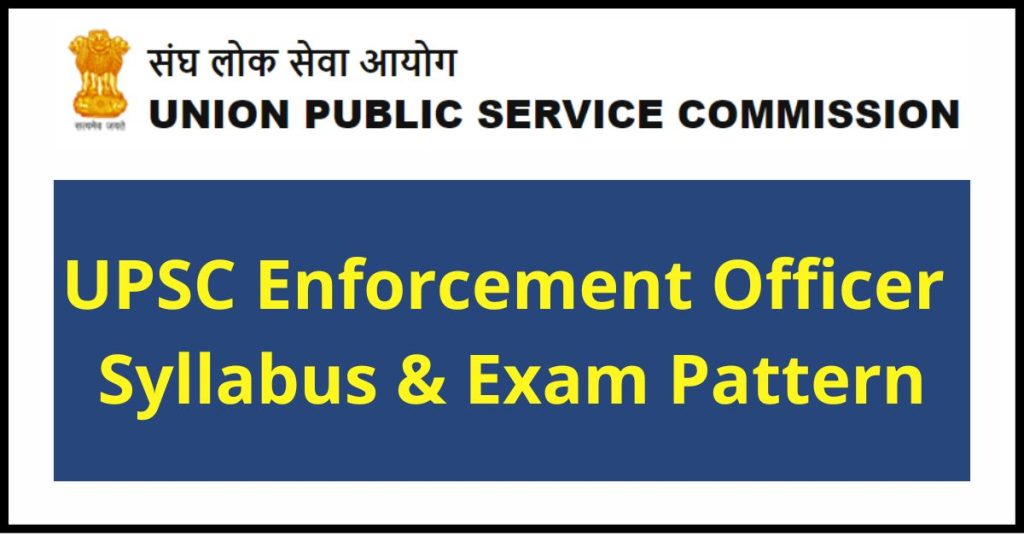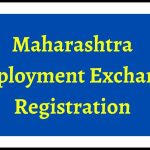UPSC Enforcement Officer Syllabus, Exam pattern-: The authority will release the examination schedule for the examination soon. Registered candidates can download the UPSC EPFO EO Admit Card which will be available very soon on the official website of UPSC. Aspirants who will be appearing for the examination must know the examination pattern and the syllabus for the examination. To get selected for the examination applicant need to follow the syllabus and the exam pattern which is mentioned in the article.
The article is also added with important contents like exam preparation tips, recruitment details and much more. Applicants are requested to go through the complete article as the details furnished in the article are very important with respect to the examination point of view. Do provide your queries regarding the post so that we can clear it.
UPSC Enforcement Officer Syllabus
In order to clear the examination applicant must know the examination pattern and syllabus the examination. By knowing the exam pattern applicant can strategize how to attempt the questions. The authority has released the complete syllabus and the examination pattern on the recruitment notification. However, we will be briefing the complete information step by step so that the applicant can easily go through the details and can get the exam pattern and the syllabus for the examination.

Detailed Overview for the UPSC EO Recruitment
The detailed overview for recruitment will help the candidates to know about the examination schedule and post-examination process.
| Authority | Employees’ Provident Fund Organisation |
| EPFO Official Website | epfindia.gov.in |
| Exam Conducting Authority | Union Public Service Commission |
| UPSC Official Website | upsc.gov.in |
| Category | Syllabus |
| Post Name | Enforcement Officer |
| Vacancies | TBA |
| Examination Mode | Pen/Paper Mode |
| Selection Process | Written Examination, Interview, and Document Verification |
| Probation Period | 2 Years |
| Job Location | Circle Wise |
UPSC Enforcement Officer Examination Pattern
The examination pattern for the UPSC Enforcement Officer recruitment is mentioned below. All the important points about the examination pattern can be extracted from here.
| Exam Duration | 120 Minutes (2 Hours) |
| UPSC EO Examination Mode | Offline (Pen/Paper Mode) |
| Nature of Examination | MCQ, Objective Type question paper |
| Marks Weightage for each question | 100 questions for 100 Marks |
| Exam Language | English and Hindi |
| Negative Marking | Yes (1/3 marks deducted for the wrong answer) |
| Negative Marking if Question left Unattempted | No marks will be deducted for unattempted question |
UPSC Enforcement Officer Syllabus Syllabus
The syllabus for the UPSC examinations is vast. However, the applicant preparing for the Enforcement officer examination must go through all the relevant books that are concerned with the post. Applicants can have the complete syllabus for the examination below.
The particulars for the syllabus of the UPSC Enforcement officer Examination are from the subjects-:
General English
- Error Spotting,
- Para Jumbles,
- Synonyms/Antonyms,
- Phrase replacement,
- Cloze Test,
- Spellings,
- Sentence completion/ para completion,
- Phrases/ Idioms,
- Fill in the Blanks,
- Reading comprehension.
Indian Freedom Struggle
| Revolt of 1857, Indian National Movement – Cause and Rise | 1st War of Independence Against British, Lucknow Pact, Important Indian Freedom Fighter |
| Indian Nationalism | Moderate Phase, Rowlatt Act, Partition of Bengal 1905, Jallianwala Bagh Massacre, Morley-Minto Reforms |
| Indian National Movement | Revolutionaries in the Indian Freedom Movement, Extremist Period, Non-Cooperation Movement, Rise of Gandhi in Indian Freedom Struggle, Simon Commission, First Round Table Conference 1930, Indian Independence Act 1947, Home Rule Movement, Swaraj Party, Cripps Mission, Gandhi-Irwin Pact, Quit India Movement, Salt Satyagraha, Moplah Rebellion of 1921, Indian National Congress Sessions. |
Current Events and Developmental Issues
- 6 months Current Affairs which includes both National and International news,
- Politics,
- State Animals and Symbols,
- Population Census,
- Important Discoveries,
- Noble prize winner,
- Important Days,
- Important Inventions and their inventor,
- Finance and Banking sector,
- Sports,
- Important Books and their writers,
- Awards and their importance,
Indian Polity & Economy
- Meaning of Writ,
- National political parties and their symbols,
- Supreme Court,
- State legislature,
- Election of President and his functions,
- Emergency Provisions,
- Constitutional amendments and their importance,
- Governor and his functions,
- Facts about parliament,
- Important constitution bodies like CAG,
- Official Language,
- Fundamental Duties,
General Accounting Principles
| Accounting Concepts | Matching Concept, Realisation Concept, Separate Entity Concept, Going Concern Concept, Money Measurement Concept, Dual Aspect Concern, Cost Concept, Accounting Period Concept. |
| Accounting Conventions | Consistency, Conservatism, Materiality, Full Disclosure. |
Industrial Relations & Labour Laws
| Indian Constitution, Laws for Female workers, Provision for Worker | Maternity Benefit Act, Equal Remuneration Act, Factories Act, Vishaka Case. |
| Labor Laws in India | Trade Union Act, Minimum Wages Act, Labour Courts, Unorganized Labour, Retirement Benefits, Strikes and lockouts, Compensation Act, Industrial Disputes Act (IDA), Workman’s Employees State Insurance Act, Industrial Tribunals, International Labour Organisation (ILO), Emigration Act. |
| Ministry of Labour in India | Labour Bureau, Employees’ State Insurance Corporation (ESIC), Important OFFICES/institutes with Labour Ministry, Chief Labour Commissioner, Board of Arbitration, Welfare Commissioners. |
General Science & Knowledge of Computer Applications
The syllabus for general science is vast. Some of the important topics from which maximum questions shall be asked are given below.
| Chemistry | Chemical Change and Physical Change, Development of computers, MS Office, Chemical Properties of Substance and their uses, Surface Chemistry, Daily Science, Properties of Gases. |
| Biology | Nutrition in Animals and Plants, human body parts, Diseases, and their causes. |
| Physics | Motion, Electricity, Sound, Energy, S.I. units, Light, Wave. |
| Computer Knowledge | Input/Output Devices, Memory, Components of Computer and their functions. |
General Mental Ability & Quantitative Aptitude
| Quantitative Aptitude | Average, Profit and Loss, Speed and Distance, Algebra, Mixtures and Alligation, Problems Based on Ages, Compound Interest, HCF and LCM, Simple Interest, Partnership, Permutations and Combinations, Ratio and Proportion, Time and Work, Calendar and Clock, Percentage and its application, Probability, Time. |
| General Mental Ability | Blood Relations, Syllogism, Puzzle Test, Data sufficient, Sequence of figures, Seating Arrangement, Statement and Inferences, Directions, Series, Statement and Conclusion. |
Social Security in India
- Social security schemes for Unorganised Sector,
- Pradhan Mantri Suraksha Bima Yojana (PMSBY),
- Employees Provident Fund Organization (EPFO),
- Atal Pension Yojana (APY),
- Health Insurance and Medical Benefit,
- Disability Benefit,
- Status of Social security in India,
- Pradhan Mantri Jeevan Jyoti Bima Yojana (PMJJBY),
- Pradhan Mantri Kisan Mandhan Yojana,
- Pradhan Mantri Kisan Samman Nidhi (PM-KISAN) Yojana
- State Insurance Corporation (ESIC),
- Maternity Benefit,
- Gratuity.
Important Preparation Tips
The applicant must refer to the important preparation tips for the examination. The important points will help to score good marks in the examination.
- Make a proper timetable considering all the important subjects for the examinations.
- As the examination dates are near, therefore the applicant must not go for new topics which are never been read before.
- Make notes for the important subjects and revise them regularly.
- Emphasis on the mock test and evaluate your daily performance in the mock.
- Before a week from the examination, day tries to practice two mocks a day.
- Attending mock tests is not sufficient, applicants must their mistakes and improve them.
- To have more details about the last time preparing for the examination, please refer to the link below.
FAQs
The UPSC EPFO EO Admit card is expected to be released soon.
The duration of the examination is 120 minutes. The timings for the examination will be provided on admit card.
The selection process for the examination includes a written test, interview, and document verification process.
The exam pattern and syllabus for the examination can be easily known from this article.






